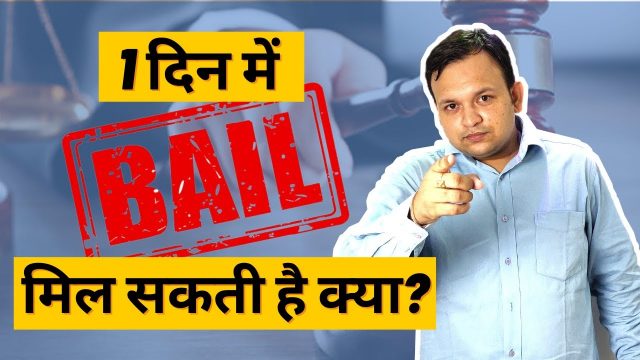What is bail?
The Criminal Procedure Code of 1973 does not define bail but enumerates bailable and non-bailable offenses. The process of getting the release of an accused charged with certain offenses is called bail. With guarantee that ensures his future attendance in the court for trial and compelling him to remain within the jurisdiction of the court. ‘Bail not jail’ is the common rule that is applied when giving bails. The idea emerges from the essentiality of liberty and the presumption of innocence until it is proven otherwise. While the court often gives bail, if the said conditions are accepted and there does not lie prima facie case against the accused.
Types of offenses
1) Bailable Offense
According to Section 2(a) of the CrPC, a bailable offense is one that is listed in the First Schedule of the Code as being eligible for bail or that is listed as such under any other legislation. If an accused person is charged with an offense that qualifies for bail, he or she has the right to request bail. If the accused is willing to post bail, the police officer or any other authority has no jurisdiction to reject the bail. A person charged with a bailable offence has the right to be freed on bail at any time while they are being detained without a warrant and at any point in the legal process, according to Section 436 of the CrPC 1973.
2) Non-Bailable Offense
Any offense that is not a bailable offense is referred to as a non-bailable offense. Anyone charged with a crime for which bail is not an option is not entitled to bail. If an individual charged with an offense for which bail is not allowed is found to be ineligible, bail may nevertheless be given. There are good reasons to think he committed a crime that carries a death or life sentence. That the accused committed a cognizable offence and was previously convicted of a crime punishable by death, life in prison, or a sentence of seven years or more, or if the accused has been found guilty two or more times of a cognizable offence for which there is no possibility of bail.
Types of Bail
1) Regular Bail
A person who commits a cognizable non-bailable offense—an offence so serious that a police officer can detain him without a warrant or launch an investigation without a court’s approval—can be taken into custody by the police, and after the duration of that custody period has passed, he must be jailed—can be taken into custody by the police. The accused is entitled to release from such custody under Sections 437 and 439 of the Criminal Procedure Code. So, in essence, a regular bail is the release of an accused person from custody in order to ensure his appearance at the trial.
2) Interim Bail
This bail is provided as a temporary measure and is valid only while an application is ongoing or when the court is considering an application for anticipatory or regular bail. If interim bail expires before the accused has been granted anticipatory bail or regular bail and he fails to pay the sum necessary to continue the bail, he forfeits his right to freedom and will be placed in custody. Interim bail is always conditional and can be prolonged.
3) Anticipatory Bail
Anticipatory bail defines itself. It is a sort of bail that is granted to someone who is expecting to be arrested by the police for an offense for which there is no possibility of a bond. These days, business rivals and other powerful individuals frequently attempt to frame their rivals in fabricated cases, making this topic a crucial one. This advanced bail is one that is referenced in Section 438 of the Act. Police cannot detain someone who has been given anticipatory bail.
Conditions for getting bail-in case of a bailable offense
The terms under which bail may be granted for offenses covered by the Indian Penal Code are outlined in Section 436(1) of the Criminal Procedure Code (1862). Anytime a person who has been detained or arrested by the police for an offense for which there is no set amount of bail is brought before the court and is willing to post bond, he may be freed on bail.
Bail in this situation may be approved by the police officer who made the arrest or by the court where the defendant has been brought. In this case, bail will typically be granted in exchange for the arrested person posting a surety. However, he may be released on bail at execution if the arresting officer or the court determines that the person is irate and unable to provide surety. This section also explains whether or not someone is indignant. If the defendant doesn’t post bail within a week of being arrested, he will be regarded as an irate person and be qualified to be released on the execution of a bond without sureties.
The bail issuing authority must be convinced of the following before releasing somebody on bail:
- The accused appears to be innocent, which means that he most likely did not commit the crime.
- That additional investigation into the offence is necessary to determine whether he has actually committed the offence.
- The crime is not serious, meaning that it cannot be punished with death, life in prison, or even a 10-year sentence.
The circumstances under which bail may be refused, even if the offence is one that is bailable, are outlined in sub-section (2) of this section. If a person is arrested or brought before the court on a second occasion in the same case and fails to comply with the conditions of appearance specified in the bail-bond, bail may be refused.
Conditions for getting a bail in case of a non-bailable offense
Bail may even be given for committing offences that are not subject to bail, according to Section 437 of the Code of Criminal Procedure, 1973. However, in this case, the Court has the discretion, and the accused is not entitled to it. Any court other than the High Court or the Court of Sessions may grant bail to a person who has been unlawfully detained and produced before a court under this provision. If the court has good reason to think that the defendant committed a crime carrying a death or life sentence, it may refuse to grant bail. The Court may also deny bail if the offence is cognizable and the defendant has a prior conviction for a crime carrying a death or jail sentence for seven years or more or found guilty on two or more occasions of a crime carrying a three-year minimum sentence.
The following requirements must be met before the accused can be released on bail if they are believed to have committed, abetted, conspired, or attempted to commit a crime punishable by seven years or more in prison:
- the bail bond’s requirements for attendance,
- the pledge to refrain from committing a similar crime,
- and the commitment not to offer any enticement, threat, or promise to anybody who knows the case’s specifics
Conclusion
The Indian legal system is plagued with the problem of legal cases dragging for many years; this makes the trial the punishment. Bail, in these circumstances is an embodiment of personal liberty. Liberty is a fundamental right that can’t be taken away unless and until there is a prima facie case against the accused. Until proven, the accused has the right to liberty.
Feel free to connect with us, for a better understanding of legal concepts!
If still doubts persist, consult legal experts at












